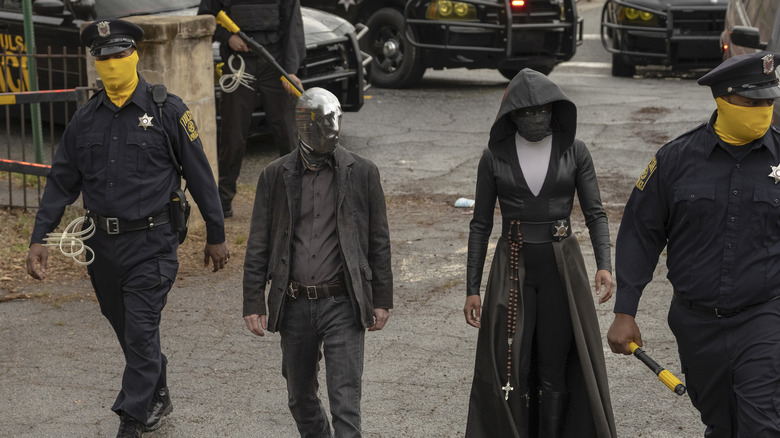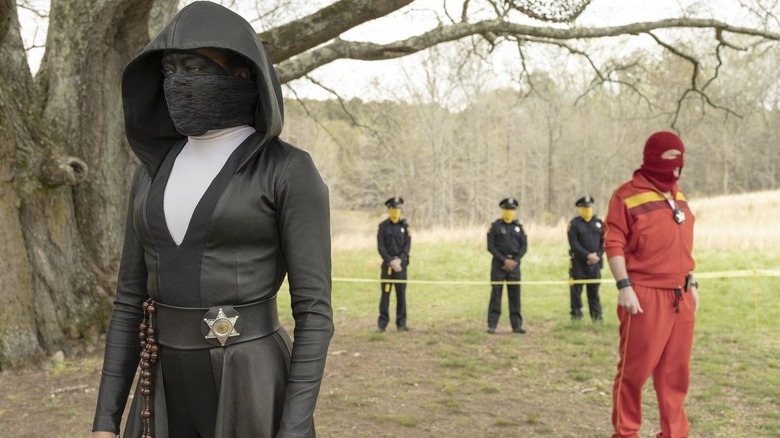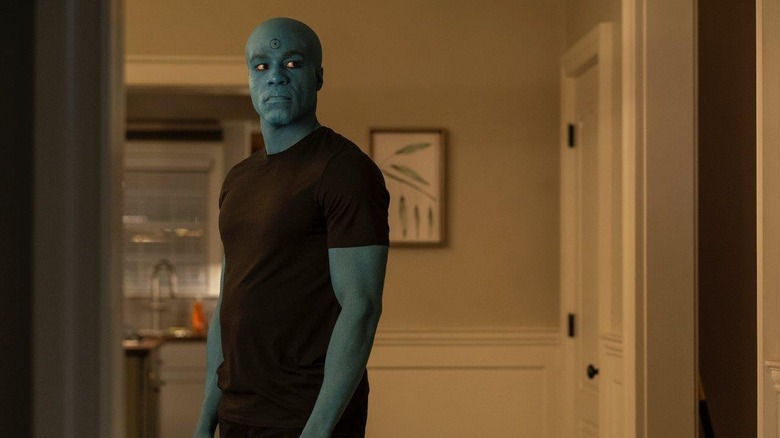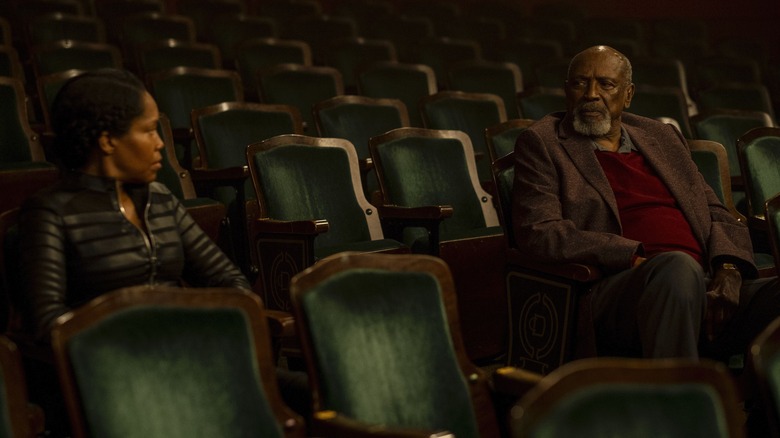Damon Lindelof Doesn't See Watchmen As A Superhero Series
I'm not sure if I believe in God, but I definitely believe in Damon Lindelof. It wasn't enough for the man to be the showrunner for the groundbreaking series "Lost" (the ending of which was great, thank you very much), but he also had to go and make the best TV show of all time, "The Leftovers." (He also wrote a great episode of "Phineas and Ferb" as well as the absurdly over-nitpicked movie "Prometheus.") The world has not always been kind to Lindelof — for some reason, people are still spreading around the rumor that the characters on "Lost" were dead the whole time — but that hasn't stopped him from continuing to write bold, emotionally resonant stories that aren't afraid to get a little weird.
That's exactly what we got with Lindelof's 2019 miniseries "Watchmen." Rather than trying to do another standard adaptation of Alan Moore's graphic novel, Lindelof and his writing team created something more akin to a sequel. (Lindelof himself referred to it as a remix.) Whereas the original graphic novel takes place in an alternate universe of 1985, the remix takes place in the same alternate universe in 2019. The series takes all the crazy stuff that happened in the source material's version of 1985 — like the existence of the all-powerful Doctor Manhattan, or the fact that a giant alien squid destroyed half of New York City — and explores how this world would've realistically changed over the next thirty-plus years, with those events in mind. It's not just the characters on this show that make it worth watching, but just how cool and unique this alternate universe is.
Not really a superhero show
One of the biggest things that make the show unique is the way it approaches its superhero characters. As Lindelof told Entertainment Weekly:
"In 'The Boys,' you have superpowered individuals in capes that can shoot lasers out of their eyes and fly around and have feats of strength and turn invisible. Nobody on 'Watchmen' can do that. So I felt like we wouldn't be deconstructing the superhero myth because all the characters in 'Watchmen' are just humans who play dress up."
Instead, the show uses its not-so-super heroes as a vehicle to explore the problems inherent to policing, diving into what would motivate a person to put on a mask and go about such a job. The main character Angela (Regina King) is a detective who goes by the superhero title Sister Night. She's a mostly good and sympathetic person motivated by the pain inflicted on her as a child. Although the mask gives her protection from the white supremacist terrorist organization who make up the closest thing to a villain the show has, it also shields her and the other officers from accountability.
"Watchmen" depicts a world in which the police in America are liberal and diverse, and their primary targets are white supremacists. It might seem like a big step-up from our reality at first glance, but as we watch Angela and the other cops regularly (and happily) engage in police brutality and violate people's civil rights, the show argues that a liberal police force is still a police force, and it's going to lead to similar sorts of problems. It all felt like more interesting thematic ground to Lindelof than the typical superhero narrative.
Not that interested in deconstruction
One of the other challenges that comes with adapting/remixing "Watchmen" is that the original text was a strong deconstruction of superhero narratives. Doctor Manhattan was a parallel to Superman, and Rorschach was a deconstruction of a standard crime-fighting vigilante. However, with superhero stories like "The Boys," "Kickass," and of course Zack Synder's 2009 adaptation of "Watchmen" reaching the mainstream, deconstructing superhero tropes isn't as fresh as it was in the mid-80s. As Lindelof himself put it, "It's almost like the truly subversive thing that you could do right now is to celebrate a superhero because the 'dark' version, or deconstructed version, is so in the culture."
Perhaps this is why Lindelof's version of Doctor Manhattan got the storyline he did. The original graphic novel depicted Manhattan as an uncaring, apathetic person, and the show does mostly stick to that interpretation. A common thing characters point out in the show is that, considering all the amazing things Manhattan is able to do, it's a little disappointing that he chose to simply mope around Mars for most of that time. Despite this, Lindelof's "Watchmen" gives Manhattan a storyline that briefly shakes him out of his indifference. It takes the graphic novel's grim assertion that a normal person given God-like powers would lose all interest in humanity, and argues instead that maybe they wouldn't. In one of the best TV episodes of 2019, Manhattan and Angela are given a love story that's both true to the original character and which feels more emotionally effective than the 1985 romance between Manhattan and Laurie.
It's a brighter take on the character than the graphic novel. And considering "The Boys'" recent take on an all-powerful being, the idea of Manhattan only being apathetic to humanity now seems almost absurdly optimistic.
Maybe we don't need a hero to save the world
Perhaps the biggest deviation from standard superhero tropes is with the portrayal Ozymandias (Jeremy Irons). The graphic novel ends with Ozymandias dropping a giant fake alien squid on Manhattan. Although millions die, he sees this as a necessary decision to stop the tensions between America and the Soviet Union from escalating into a humanity-destroying nuclear war. And sure enough, this is basically what happens. Faced with an outside alien threat, the two superpowers decide to end their feud and work together to protect the planet from a terrifying, unknowable alien race.
Was Ozymandias right to do what he did? Alan Moore leaves that to the reader's interpretation. Ultimately, Ozymandias is a critique of the lone-wolf superhero who believes he alone knows what the right thing to do is and will stop at nothing to accomplish his goals. In Lindelof's "Watchmen," a much older Ozymandias still stands by the idea that he did the right thing, but the show itself isn't content to leave the audience's understanding of him ambiguous. The show turns him into more of a joke than his graphic novel counterpart, and ends the show with him getting arrested and having his crimes exposed. "The world will end," he tells Laurie (Jean Smart), who responds in an almost joking tone, "Yeah, people keep saying that but it never seems to happen." He then gets knocked out before he can defend himself further.
It's a bit too tidy for my tastes, but it's "Watchmen's" clearest dismissal of the god complex behind so many super-powered heroes. The idea that Ozymandias is smarter and wiser than everyone else, that he has any sort of mandate to make these decisions on behalf of humanity, is thoroughly undermined by the finale.
Setting itself apart
The "Watchmen" miniseries is particularly impressive when you look at it from a 2022 perspective, after we've spent the last year or so watching a string of MCU mini-series released on Disney+. "Watchmen" is a nine-episode run that not only fully explores its characters' psyches, but takes full advantage of the medium of TV to do it. Marvel's shows are often criticized as being long-winded movies split up into six parts, but nobody could argue that Lindelof's "Watchmen" was supposed to be a TV show. It structured its episodes as a series of deep dives into each main character while still advancing the overall plot. The final episode didn't center around some big CGI battle, and it was made with no intention of teasing a sequel or contributing to a larger universe.
It's all because "Watchmen" wasn't really a superhero show in any conventional use of the term. The narrative core of the series was about intergenerational trauma and learning to live with it in a way that isn't destructive. That's why the big emotional climax of the finale is not the Seventh Kavalry getting murdered, but Angela having a thoughtful conversation with her grandfather about how she can't keep hiding her pain behind a mask. As Lindelof put it:
"There are interesting themes to explore here when your mask both hides you and shows you at the same time — because your mask is actually a reflection in yourself. What's the trauma an individual has that goes into the mask they wear? All that felt Watchmen-y to me. Again, these are not original ideas, but ones I thought were timely when we all have these different identities in code now."




